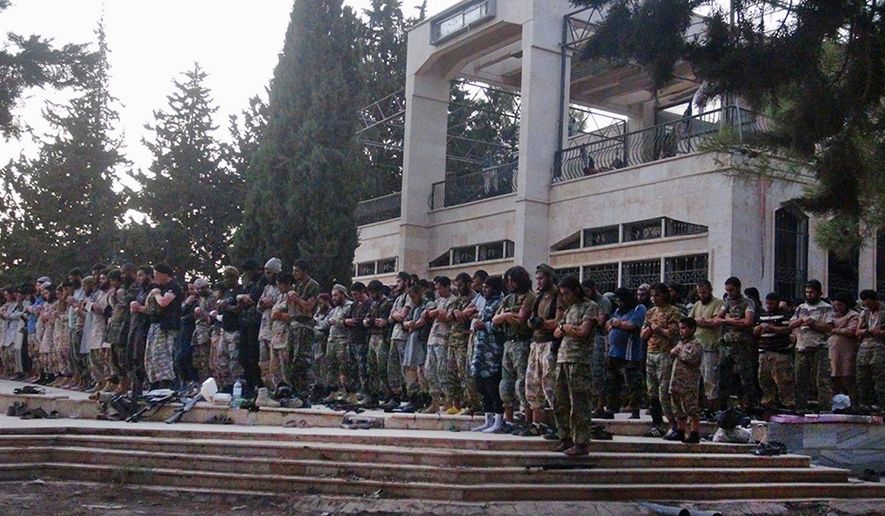Americans are increasingly open to putting U.S. troops in combat to stop the Islamic State, according to polling that could boost hawks pushing Congress to approve the broadest grant of force to President Obama to escalate the fight in Iraq and Syria.
Mr. Obama has been reluctant to commit troops to the fight beyond logistics support, but the country is moving in that direction, with American opinion about evenly split, according to a Pew Research Poll released last week. In October, 39 percent favored using U.S. ground forces.
Overall, nearly two-thirds of Americans support U.S. involvement in a campaign against the Islamic State.
“I think the American public is understanding what it takes to defend America,” said Sen. Lindsey Graham, South Carolina Republican. “Ground troops over there as part of a regional force defends the homeland here.”
Mr. Obama submitted a request to Congress last month for new permission to fight the Islamic State, calling for a three-year commitment to the war but saying he doesn’t want to use ground troops.
His plans have left both sides on Capitol Hill stewing.
Many Republicans say Mr. Obama was unnecessarily tying his own hands by placing so many restrictions on his use of troops.
Democrats say the president has left himself too much wiggle room by prohibiting only “enduring offensive ground combat operations” in his draft resolution.
“You send up here an AUMF with this giant loophole you could drive, you know, a combat truck through,” Sen. Barbara Boxer, California Democrat, said at a Senate Committee on Foreign Relations hearing last week. “It is not going to get a lot of support among, I think, the Democrats on this committee.”
That partisan divide is playing out in the public as a whole, both on ground troops to fight the Islamic State and on broader questions of how to pursue the global war on terrorism. Pew’s poll, conducted Feb. 18-22, found nearly three-quarters of Republicans saying the solution is “overwhelming force.” Just 30 percent of Democrats agreed.
Nick Heras, a Middle East researcher at the Center for New American Security, said many Americans are worried about getting too involved in the conflict and believe the brunt of ground operations should fall to local allies.
“I think there’s deep resistance for the United States to have long-term boots on the ground on the scale of what we saw at the height of the Iraq War or Afghanistan,” he said. “Ultimately, the campaign against [the Islamic State] will be won or lost by the ability of partners on the ground in the region to carry the fight to the Islamic State.”
The president has been conducting airstrikes against the Islamic State for more than six months, claiming that he has authority to do so under previous authorizations in 2001 and 2002 against al Qaeda and Iraq. Despite that, Mr. Obama has emphasized that he still wants buy-in from Congress on the war effort against the Islamic State.
When they received the president’s plan, members of Congress stressed that while it’s important to act as quickly as possible, it’s more important to make sure the process of considering the plan is done right. Committee leaders promised a robust hearing process in both chambers.
The Senate Foreign Relations Committee is holding a closed hearing on the campaign against the Islamic State on Tuesday afternoon with witnesses from the State Department and Defense Intelligence Agency. The House Armed Services Committee is also meeting on Tuesday to discuss the president’s proposed authorization with Gen. Lloyd Austin, commander of U.S. Central Command, which overseas military operations in the Middle East.
While the international relations committees in both chambers will take the lead, Sen. John McCain, Arizona Republican and chair of the Senate Armed Services Committee, said he wants his committee to shape the debate as well, since U.S. troops could be involved.
“If there’s part of it that calls for enduring troop presence, then the Senate Armed Services Committee has some jurisdiction,” he said last week. “Anything to do with military troops is under the purview of Armed Services.”
When asked if he thought lawmakers were committed to getting an authorization done, even if it differed from the president’s plan, he didn’t seem optimistic.
“I’m not sure, because you need presidential leadership on these things, and there is none,” he said.
Despite that, a poll conducted last week by National Journal suggests the majority of analysts in both parties believes Congress will pass an authorization this year. Seventy-eight percent of Republican and Democratic insiders said that Congress will find a way to approve an authorization, especially as public support for the war effort grows.
Lawmakers on Capitol Hill have also questioned whether the authorization would allow the U.S. military to protect rebel fighters the U.S. is training from attacks by Syrian President Bashar Assad.
Secretary of State John F. Kerry told the Senate Foreign Relations Committee last week that the administration is currently looking at the best way to protect those who are fighting the Islamic State, but that no final decisions have been made.
“I think we need to be discussing that as the AUMF comes together,” he said. “But what is important is that the president have as much leeway as possible within the three years that he’s asked for to be able to get the job done.”
• Jacqueline Klimas can be reached at jklimas@washingtontimes.com.




Please read our comment policy before commenting.